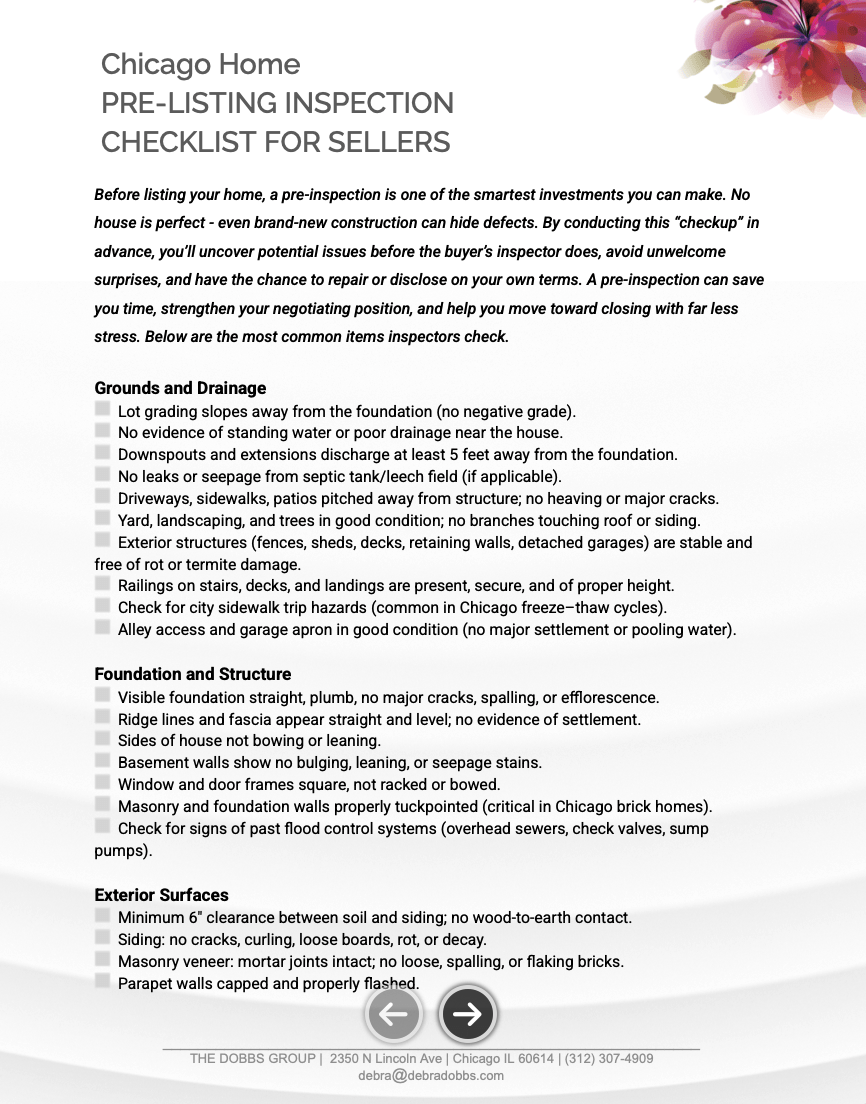Getting Ready To Sell Your Home? Top Reasons A Pre-Listing Home Inspection Will Give You An Edge!
Data shows that 86% of home buyers have a home inspection as part of the purchase process. Only 6% of home sellers have a pre-listing home inspection, but that figure is rising. This is partly due to agents walking their seller clients through the benefits of a pre-sale inspection, especially as a strategy to prevent canceled contracts and to gain a marketing edge.
Listed below are the pros and cons of a pre-listing home inspection.
1. Identify deferred maintenance and potential defects before your buyer’s inspector
- A pre-listing inspection can be ‘inspection lite’ or as in-depth as a typical purchase inspection. Uncover hidden defects, deferred maintenance, and potential code violations before the buyer sets foot in your home.
- With the inspection report in hand, you can discuss with your agent how to prioritize repairs that will have the most impact on the sale.
- Decide which repairs should be done pre-listing, which are minor enough not to be an issue, and which are serious enough to derail the sale.
2. Put Your Best Foot Forward to Enhance Marketability and Instill Agent and Buyer Confidence
- A home inspected pre-listing indicates transparency on the part of the seller, which builds trust and confidence with a prospective buyer, making the property more attractive in a competitive market.
- Prospective buyers feel more comfortable making offers on homes with fewer unknowns, which can lead to shorter market time and less friction during the attorney review process.
3. Build a Stronger Negotiating Position
- When you address maintenance and repair issues before showings and an offer, you reduce the buyers’ leverage to negotiate for price reductions or repair credit requests.
- Price your home more accurately and at the higher end of the optimal price range, with fewer surprises during the negotiation process.
4. Speed Up the Sales Process
- A home in A+ condition eliminates a lengthy negotiation over inspection items during the attorney review period, so the deal can be wrapped up more quickly.
- In some cases, the buyer may opt to skip their own inspection or feel reassured by the existing report, leading to a smooth and quick attorney/inspection due diligence phase.
5. Reduce the Risk of the Contract falling during Attorney Review or Potential Litigation
- Disclosing known issues and repairs helps avoid potential legal disputes after the sale.
- Being upfront about the home’s condition protects both parties and minimizes future liability.
6. Enhance Your Property’s Appeal to Distinguish It in the Market
- Homes that have gone through the rigor of a pre-listing inspection stand out as well-maintained and are more attractive to prospective buyers.
What To Consider Before Engaging in a Pre-Listing Inspection
- Discuss with your attorney what your legal obligations are if your pre-listing inspection points out material defects and or structural issues, whether they are fixed or not.
- A home inspection in Chicago can cost $500 and up, depending on the size.
- Repairs made may not align with every buyer’s preferences, but most buyers appreciate transparency and proactive maintenance.
- A pre-listing home inspection gives sellers control, confidence, and a competitive edge, often resulting in a faster, smoother, and more profitable sale.
How to prepare for a pre-listing inspection
- Hire a qualified home inspector with experience in your neighborhood and property type. Your listing agent is a good resource for recommendations, or reach out to professional inspector organizations like ASHI or InterNACHI.
- Pull together maintenance records, warranties, and permits for any work you have done in the home. You will need these for the buyer, and this information will be helpful to the inspector.
- Make sure all areas of your home are accessible – roof, crawl space, HVAC equipment (furnace and compressor), and electrical panel box. Remove clutter where possible, especially your utility closet.
- Remove pets or secure them during the inspection.
What to expect your inspector to do at the home inspection
- Mechanical Systems: The inspector will examine the heating, ventilation, and air conditioning (HVAC), plumbing, and electrical systems to ensure they are operational and up to code.
- Structural Integrity: This includes a detailed review of the foundation, roof, attic, basement, or crawl space, and overall framing for signs of damage, leaks, cracks, or wear.
- Exterior: Your inspector will look at the exterior material, windows, doors, decks, balconies, gutters, and drainage for damage, rot, and improper installation.
- Interior: The inspector will assess each room – walls, ceilings, floors, doors, and windows – looking for any cracks, water stains, sagging, pest damage, and to make sure doors and windows are properly installed and operate smoothly. Kitchens and Bathrooms are inspected to be sure all appliances, fixtures, and ventilation are operating as they should.
- Safety Features: The inspector will look for smoke detectors, carbon monoxide detectors, and hand railings as may be required under code.
- Garage and Other Exterior Structures: The condition and operation of garage doors, openers, and any detached structures (like sheds or fences) are reviewed for function and condition.
The inspection will take about 2 to 4 hours, depending on the size of your home. Within a day or so, the inspector will provide a detailed report with photos and recommendations to address any deficiencies. You can choose to share this report with your agent, who will be an authoritative resource on what items should be addressed to ensure a smooth transaction at the best price possible.
If you are looking for an A+ licensed and certified inspection team, please reach out with any questions, for a recommendation, and if you would like a digital copy of Debra’s Little Black Book, filled with all of my preferred vendors and resources, please email [email protected].






